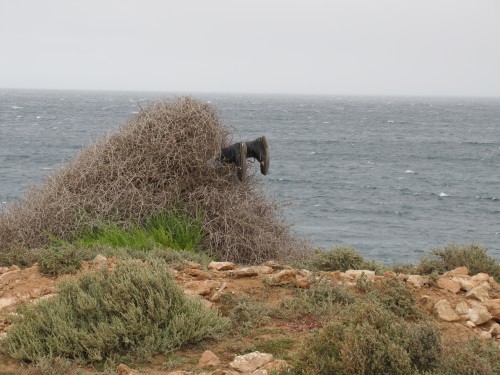Life is tough in the Aussie bush
Life has certainly been tough in most parts of the Australian countryside for more than a decade now. Many rural people have experienced devastating droughts, overwhelming floods, unbelievable locust and mice plagues, raging bushfires, economic downturns and unsympathetic banks. Sadly, many have not coped with the stresses of these disasters and have ended their lives. Suicide is a serious issue in many rural communities, and all it does is solve the problem for the individual, leaving further tragedy and perhaps guilt for those left behind.
With typical laconic Aussie humour in the midst of all this angst, the poor fellow shown in the photo above couldn’t even get his last act right. Instead of leaping over the cliff to the rocks below, he stumbled into a boxthorn bush. What a harsh way to go!
Seriously, although we may laugh at this poor fellow’s tragic and misplaced end, suicide is no laughing matter. If you are experiencing stress, anxiety or depression, or know someone who is, please consult your family doctor ASAP. In the meantime, sites like Beyond Blue here in Australia can be a first step on the path to recovery. There is help available and professionals can show that there is hope in seemingly hopeless situations. This hasn’t always been the case. When I was young three close relatives needlessly took their own lives; they didn’t know where to turn for help.
Writers make up a group most at risk. We often work long hours alone, cloistered by necessity. Getting published can be depressingly difficult. Finances can be stretched to breaking point just as our spirits can also break. Be sure to get help if that’s where you’re at.
Good writing and good health.
ANZAC Day in Australia
On April 25th Australians and New Zealanders all over the world celebrate ANZAC Day. This is a very special day on the calendar of both nations.
ANZAC is an acronym for Australian and New Zealand Army Corps. It is regarded by many in Australia as the day our nation took its place on the world stage. Soldiers from both countries landed on the beach of what was later called Anzac Cove at Gallipoli in Turkey on 25th April, 1915. It was at a terrible cost; many thousands of soldiers on both sides died in a protracted battle lasting many months.
ANZAC Day is celebrated throughout Australia and New Zealand and in many other parts of the world to commemorate this special event. Most communities – from small townships through the largest cities – hold Dawn Services to remember the fallen soldiers. Parades are a feature of our larger cities. As the soldiers who survived pass away with the passage of time, their places are proudly taken by their children and grandchildren, most wearing their badges and decorations with great respect and pride.
In the early 1980s the numbers observing this great event in our history dwindled as the numbers of survivors declined. In the last decade however, this trend has been reversed. As the last of the survivors of the attack in Gallipoli died several years ago, many of the younger generation – those in their twenties and thirties – suddenly realised the passing of history. Every year since the parades and observances have seen ever increasing numbers of participants, all eager to remember this significant turning point in our history. Of particular interest is the increasing number of people – again, mostly younger people – who make the long pilgrimage to Gallipoli itself. The emotionally moving Dawn Service on ANZAC Day is often attended by over twenty thousand people.
For more information click here.
